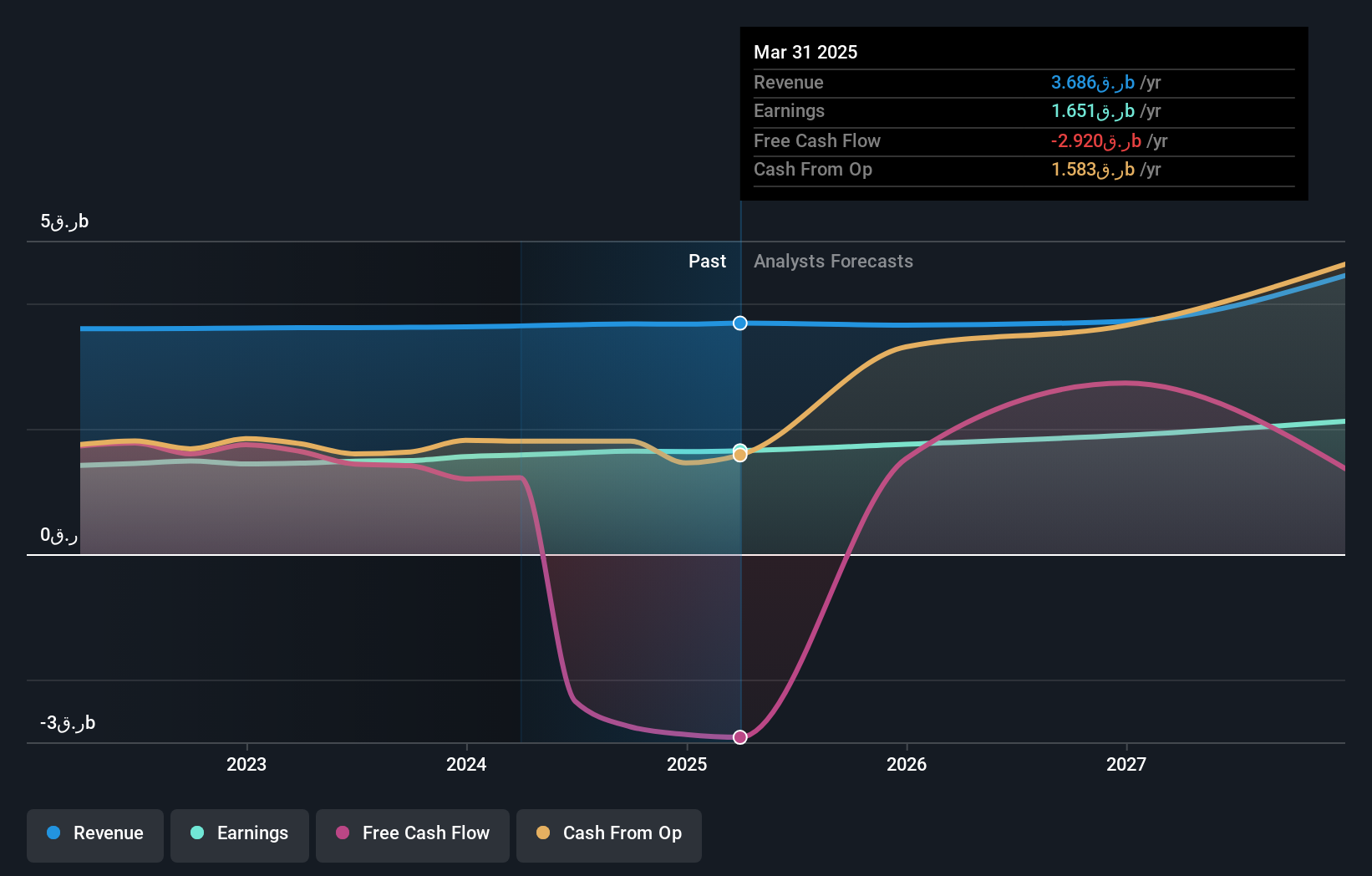With 45% ownership in Qatar Gas Transport Company Limited (Nakilat) (QPSC) (DSM:QGTS), institutional investors have a lot riding on the business
Key Insights
- Given the large stake in the stock by institutions, Qatar Gas Transport Company Limited (Nakilat) (QPSC)'s stock price might be vulnerable to their trading decisions
- A total of 2 investors have a majority stake in the company with 51% ownership
- Using data from analyst forecasts alongside ownership research, one can better assess the future performance of a company
To get a sense of who is truly in control of Qatar Gas Transport Company Limited (Nakilat) (QPSC) (DSM:QGTS), it is important to understand the ownership structure of the business. We can see that institutions own the lion's share in the company with 45% ownership. In other words, the group stands to gain the most (or lose the most) from their investment into the company.
And things are looking up for institutional investors after the company gained ر.ق1.1b in market cap last week. One-year return to shareholders is currently 20% and last week’s gain was the icing on the cake.
Let's delve deeper into each type of owner of Qatar Gas Transport Company Limited (Nakilat) (QPSC), beginning with the chart below.
View our latest analysis for Qatar Gas Transport Company Limited (Nakilat) (QPSC)

What Does The Institutional Ownership Tell Us About Qatar Gas Transport Company Limited (Nakilat) (QPSC)?
Many institutions measure their performance against an index that approximates the local market. So they usually pay more attention to companies that are included in major indices.
We can see that Qatar Gas Transport Company Limited (Nakilat) (QPSC) does have institutional investors; and they hold a good portion of the company's stock. This can indicate that the company has a certain degree of credibility in the investment community. However, it is best to be wary of relying on the supposed validation that comes with institutional investors. They too, get it wrong sometimes. It is not uncommon to see a big share price drop if two large institutional investors try to sell out of a stock at the same time. So it is worth checking the past earnings trajectory of Qatar Gas Transport Company Limited (Nakilat) (QPSC), (below). Of course, keep in mind that there are other factors to consider, too.

Qatar Gas Transport Company Limited (Nakilat) (QPSC) is not owned by hedge funds. Milaha Capital is currently the largest shareholder, with 36% of shares outstanding. In comparison, the second and third largest shareholders hold about 14% and 2.1% of the stock.
A more detailed study of the shareholder registry showed us that 2 of the top shareholders have a considerable amount of ownership in the company, via their 51% stake.
Researching institutional ownership is a good way to gauge and filter a stock's expected performance. The same can be achieved by studying analyst sentiments. There are plenty of analysts covering the stock, so it might be worth seeing what they are forecasting, too.
Insider Ownership Of Qatar Gas Transport Company Limited (Nakilat) (QPSC)
While the precise definition of an insider can be subjective, almost everyone considers board members to be insiders. Management ultimately answers to the board. However, it is not uncommon for managers to be executive board members, especially if they are a founder or the CEO.
Most consider insider ownership a positive because it can indicate the board is well aligned with other shareholders. However, on some occasions too much power is concentrated within this group.
Our information suggests that Qatar Gas Transport Company Limited (Nakilat) (QPSC) insiders own under 1% of the company. Keep in mind that it's a big company, and the insiders own ر.ق1.3m worth of shares. The absolute value might be more important than the proportional share. Arguably, recent buying and selling is just as important to consider. You can click here to see if insiders have been buying or selling.
General Public Ownership
With a 41% ownership, the general public, mostly comprising of individual investors, have some degree of sway over Qatar Gas Transport Company Limited (Nakilat) (QPSC). This size of ownership, while considerable, may not be enough to change company policy if the decision is not in sync with other large shareholders.

Next Steps:
While it is well worth considering the different groups that own a company, there are other factors that are even more important. For instance, we've identified 1 warning sign for Qatar Gas Transport Company Limited (Nakilat) (QPSC) that you should be aware of.
Ultimately the future is most important. You can access this free report on analyst forecasts for the company.
NB: Figures in this article are calculated using data from the last twelve months, which refer to the 12-month period ending on the last date of the month the financial statement is dated. This may not be consistent with full year annual report figures.
Have feedback on this article? Concerned about the content? Get in touch with us directly. Alternatively, email editorial-team (at) simplywallst.com.
This article by Simply Wall St is general in nature. We provide commentary based on historical data and analyst forecasts only using an unbiased methodology and our articles are not intended to be financial advice. It does not constitute a recommendation to buy or sell any stock, and does not take account of your objectives, or your financial situation. We aim to bring you long-term focused analysis driven by fundamental data. Note that our analysis may not factor in the latest price-sensitive company announcements or qualitative material. Simply Wall St has no position in any stocks mentioned.
 Wall Street Journal
Wall Street Journal